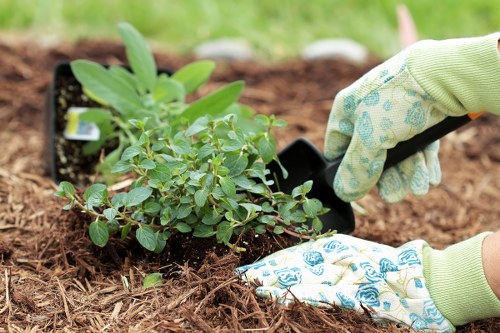Oil Stain Removal for Driveways in Swiss Cottage

Maintaining a clean driveway is essential for both the aesthetics and longevity of your property. In Swiss Cottage, oil stains can be a common issue due to frequent vehicle traffic and various weather conditions. Understanding effective oil stain removal techniques can help homeowners restore their driveways to pristine condition.
Oil stains not only detract from the visual appeal of your driveway but can also cause long-term damage to the surface. Addressing these stains promptly and effectively is crucial to prevent further deterioration and costly repairs.
There are several methods available for removing oil stains, ranging from DIY solutions to professional services. Each method varies in complexity, cost, and effectiveness, allowing homeowners to choose the best approach based on their specific needs and circumstances.
Understanding the Causes of Oil Stains

Oil stains typically occur when vehicles leak oil or other lubricants onto the driveway surface. Common sources include engine leaks, dripping from the exhaust system, or oil spills during maintenance tasks.
Over time, oil can penetrate porous driveway materials like concrete or asphalt, making stains difficult to remove. Additionally, environmental factors such as rain and snow can exacerbate the problem by causing the oil to spread and seep deeper into the surface.
Identifying the source of the oil leak is the first step in preventing future stains. Regular vehicle maintenance and prompt repairs can significantly reduce the likelihood of oil spills on your driveway.
DIY Oil Stain Removal Methods

For homeowners looking to tackle oil stains themselves, several DIY methods can be both effective and economical. These methods often involve common household items and simple techniques.
Baking Soda and Dish Soap: This combination is a popular choice for breaking down oil. Sprinkling baking soda on the stain, applying dish soap, and scrubbing with a brush can help lift the oil from the driveway surface.
Cat Litter or Absorbent Materials: Clay-based cat litter can absorb excess oil. Covering the stain with cat litter, allowing it to sit overnight, and then sweeping it away can reduce the stain’s visibility.
Commercial Oil Stain Removers

When DIY methods are insufficient, commercial oil stain removers offer a more potent solution. These products are specifically formulated to break down and eliminate oil stains effectively.
Products like Oil Eater or Simple Green Oil & Grease Remover can be applied directly to the stain, left to sit for a prescribed time, and then washed away. Always follow the manufacturer’s instructions for the best results.
While commercial removers are generally safe for most driveway surfaces, it’s advisable to test a small, inconspicuous area first to ensure there is no adverse reaction.
Pressure Washing for Deep Cleaning

Pressure washing is an effective method for removing stubborn oil stains and overall driveway cleaning. The high-pressure water jets can penetrate deep into the driveway material, dislodging embedded oil particles.
Using a pressure washer with a suitable detergent can enhance the cleaning process. It’s important to use the correct pressure setting to avoid damaging the driveway surface, especially for delicate materials like asphalt.
Professional pressure washing services may offer more powerful equipment and expertise, ensuring thorough cleaning without causing harm to the driveway.
Preventive Measures to Avoid Future Oil Stains

Preventing oil stains is more effective and less labor-intensive than removing them. Implementing preventive measures can help maintain a clean and attractive driveway.
Regular Vehicle Maintenance: Ensuring your vehicle is in good condition can prevent leaks. Regularly check for oil leaks and address any issues promptly.
Use of Car Mats: Placing mats under vehicles can catch drips and spills, reducing the likelihood of oil reaching the driveway surface.
Choosing the Right Driveway Material

The choice of driveway material can influence how susceptible it is to oil stains and how easily it can be cleaned. Materials like concrete and asphalt are popular but have different staining characteristics.
Concrete: While durable, concrete can absorb oil, making stains challenging to remove. Sealing the concrete can provide a protective barrier against oil penetration.
Asphalt: Asphalt driveways are slightly more forgiving when it comes to oil stains but still require regular maintenance and sealing to prevent long-term damage.
Local Services in Swiss Cottage

Residents of Swiss Cottage have access to various local services specializing in driveway cleaning and oil stain removal. These professionals utilize advanced techniques and equipment to ensure effective stain removal.
Hiring a local expert can save time and effort, providing peace of mind that the job is done correctly. Additionally, local professionals are familiar with the specific challenges and common issues faced in the Swiss Cottage area.
When selecting a service provider, consider factors such as experience, customer reviews, and the range of services offered to ensure you receive the best possible care for your driveway.
Environmental Considerations

Cleaning oil stains involves the use of various chemicals and water resources. Being mindful of environmental impact is important to ensure that cleaning practices do not harm the surrounding ecosystem.
Opting for eco-friendly cleaning solutions can minimize the negative effects on plants and wildlife. Additionally, proper disposal of oil-contaminated materials is essential to prevent pollution.
Local regulations may dictate how and where runoff water can be managed during the cleaning process, so it’s important to comply with these guidelines to protect the environment.
Cost of Oil Stain Removal

The cost of oil stain removal can vary based on the method chosen and the extent of the staining. DIY solutions are generally more affordable, requiring only minimal investment in cleaning supplies.
Professional services tend to be more expensive but offer comprehensive cleaning and may include additional services such as sealing and maintenance. It’s important to weigh the costs and benefits to determine the most cost-effective approach for your situation.
Factors influencing cost include the size of the driveway, the number of stains, and the type of driveway material. Getting multiple quotes from local service providers can help you find the best deal.
Maintaining a Stain-Free Driveway

Ongoing maintenance is key to keeping your driveway free from oil stains and in good condition. Regular cleaning and prompt attention to spills can prevent stains from setting in.
Seasonal maintenance, such as sealing in the spring and fall, can protect the driveway from weather-related damage and make it easier to remove any future stains.
Educating household members about the importance of immediate spill cleanup can also contribute to the overall maintenance effort, ensuring that oil stains are addressed before they become permanent fixtures.
Choosing Eco-Friendly Cleaning Solutions

Eco-friendly cleaning solutions offer an environmentally responsible alternative to traditional oil stain removal methods. These products are designed to effectively break down oil without the use of harsh chemicals.
Using natural ingredients like vinegar, baking soda, and citrus-based cleaners can minimize environmental impact while still providing effective stain removal.
Many homeowners are increasingly opting for eco-friendly solutions to reduce their carbon footprint and contribute to a healthier environment in Swiss Cottage.
Local Climate Impact on Oil Stain Removal

The local climate in Swiss Cottage, characterized by its cold winters and variable precipitation, can affect the process of oil stain removal. Cold temperatures can slow down the effectiveness of certain cleaning agents, while rain can wash away cleaning solutions before they have a chance to work.
It’s important to choose the appropriate time for stain removal, preferably during dry and mild weather conditions, to ensure optimal results.
Additionally, understanding how freeze-thaw cycles can impact driveway materials helps in selecting the right maintenance and cleaning strategies to prevent long-term damage from oil stains.
Advanced Techniques for Persistent Stains

For particularly stubborn oil stains, advanced techniques may be necessary. Methods such as solvent blasting, chemical treatments, and steam cleaning can offer more powerful solutions.
Solvent Blasting: This technique involves using solvents to break down oil molecules, making them easier to remove from the driveway surface.
Chemical Treatments: Specialized chemicals can target and dissolve oil stains that resist traditional cleaning methods.
Safety Precautions During Cleaning

When removing oil stains, it’s important to prioritize safety to protect yourself and the environment. Wearing appropriate protective gear, such as gloves and masks, can prevent skin irritation and inhalation of harmful fumes.
Proper ventilation is essential when using chemical cleaners, and ensuring that runoff water does not contaminate surrounding areas helps maintain environmental safety.
Following manufacturer instructions and local regulations can further ensure that oil stain removal is conducted safely and responsibly.
Cost-Effective Solutions for All Budgets

Oil stain removal doesn’t have to break the bank. There are cost-effective solutions available for homeowners with varying budgets.
DIY methods, using common household items, provide an affordable way to tackle stains. Investing in a good-quality pressure washer can also serve multiple purposes beyond oil stain removal.
For those willing to invest a bit more, professional services offer guaranteed results and save time and effort, making it a worthwhile investment for maintaining driveway appearance and integrity.
Local Regulations and Guidelines

Swiss Cottage residents should be aware of local regulations regarding driveway cleaning and oil stain removal. These guidelines ensure that cleaning practices do not negatively impact the local environment and comply with municipal standards.
Proper disposal of oil-contaminated materials and the use of approved cleaning agents are often mandated to prevent pollution and protect community health.
Consulting with local authorities or professional services can provide clarity on the specific regulations applicable to your area.
Conclusion

Oil stain removal is a manageable task with the right knowledge and resources. Whether opting for DIY methods or professional services, Swiss Cottage homeowners can effectively maintain their driveways and prevent long-term damage.
Implementing preventive measures and choosing appropriate cleaning techniques tailored to local conditions ensures a clean and durable driveway for years to come.
By understanding the causes, methods, and best practices for oil stain removal, you can enhance the appearance and longevity of your driveway, adding value and curb appeal to your Swiss Cottage home.
Frequently Asked Questions
- What is the best DIY method for removing oil stains from a driveway?
A combination of baking soda and dish soap is highly effective. Apply baking soda to the stain, add dish soap, scrub with a brush, and rinse with water.
- How often should I seal my driveway to prevent oil stains?
It’s recommended to seal your driveway every 2-3 years to provide a protective barrier against oil stains and other damages.
- Can pressure washing remove all oil stains?
Pressure washing is effective for many oil stains, but extremely stubborn or deeply embedded stains may require additional treatments or professional services.
- Are commercial oil stain removers safe for all driveway materials?
Most commercial removers are safe for common materials like concrete and asphalt, but it’s advisable to test a small area first to ensure there is no adverse reaction.
- What preventive measures can I take to avoid future oil stains?
Regular vehicle maintenance, using car mats, and promptly cleaning any spills are effective preventive measures to minimize future oil stains.


